Jayd Matyas
Generative agent-based modeling with actions grounded in physical, social, or digital space using Concordia
Dec 13, 2023



Abstract:Agent-based modeling has been around for decades, and applied widely across the social and natural sciences. The scope of this research method is now poised to grow dramatically as it absorbs the new affordances provided by Large Language Models (LLM)s. Generative Agent-Based Models (GABM) are not just classic Agent-Based Models (ABM)s where the agents talk to one another. Rather, GABMs are constructed using an LLM to apply common sense to situations, act "reasonably", recall common semantic knowledge, produce API calls to control digital technologies like apps, and communicate both within the simulation and to researchers viewing it from the outside. Here we present Concordia, a library to facilitate constructing and working with GABMs. Concordia makes it easy to construct language-mediated simulations of physically- or digitally-grounded environments. Concordia agents produce their behavior using a flexible component system which mediates between two fundamental operations: LLM calls and associative memory retrieval. A special agent called the Game Master (GM), which was inspired by tabletop role-playing games, is responsible for simulating the environment where the agents interact. Agents take actions by describing what they want to do in natural language. The GM then translates their actions into appropriate implementations. In a simulated physical world, the GM checks the physical plausibility of agent actions and describes their effects. In digital environments simulating technologies such as apps and services, the GM may handle API calls to integrate with external tools such as general AI assistants (e.g., Bard, ChatGPT), and digital apps (e.g., Calendar, Email, Search, etc.). Concordia was designed to support a wide array of applications both in scientific research and for evaluating performance of real digital services by simulating users and/or generating synthetic data.
Melting Pot 2.0
Dec 13, 2022Abstract:Multi-agent artificial intelligence research promises a path to develop intelligent technologies that are more human-like and more human-compatible than those produced by "solipsistic" approaches, which do not consider interactions between agents. Melting Pot is a research tool developed to facilitate work on multi-agent artificial intelligence, and provides an evaluation protocol that measures generalization to novel social partners in a set of canonical test scenarios. Each scenario pairs a physical environment (a "substrate") with a reference set of co-players (a "background population"), to create a social situation with substantial interdependence between the individuals involved. For instance, some scenarios were inspired by institutional-economics-based accounts of natural resource management and public-good-provision dilemmas. Others were inspired by considerations from evolutionary biology, game theory, and artificial life. Melting Pot aims to cover a maximally diverse set of interdependencies and incentives. It includes the commonly-studied extreme cases of perfectly-competitive (zero-sum) motivations and perfectly-cooperative (shared-reward) motivations, but does not stop with them. As in real-life, a clear majority of scenarios in Melting Pot have mixed incentives. They are neither purely competitive nor purely cooperative and thus demand successful agents be able to navigate the resulting ambiguity. Here we describe Melting Pot 2.0, which revises and expands on Melting Pot. We also introduce support for scenarios with asymmetric roles, and explain how to integrate them into the evaluation protocol. This report also contains: (1) details of all substrates and scenarios; (2) a complete description of all baseline algorithms and results. Our intention is for it to serve as a reference for researchers using Melting Pot 2.0.
Hidden Agenda: a Social Deduction Game with Diverse Learned Equilibria
Jan 05, 2022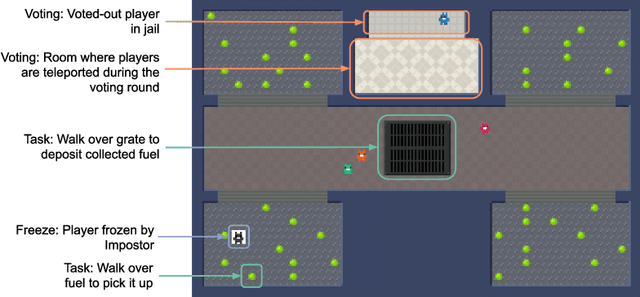

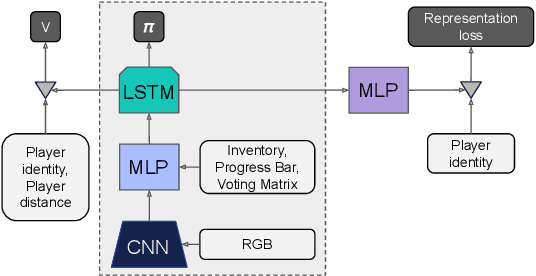

Abstract:A key challenge in the study of multiagent cooperation is the need for individual agents not only to cooperate effectively, but to decide with whom to cooperate. This is particularly critical in situations when other agents have hidden, possibly misaligned motivations and goals. Social deduction games offer an avenue to study how individuals might learn to synthesize potentially unreliable information about others, and elucidate their true motivations. In this work, we present Hidden Agenda, a two-team social deduction game that provides a 2D environment for studying learning agents in scenarios of unknown team alignment. The environment admits a rich set of strategies for both teams. Reinforcement learning agents trained in Hidden Agenda show that agents can learn a variety of behaviors, including partnering and voting without need for communication in natural language.
Scalable Evaluation of Multi-Agent Reinforcement Learning with Melting Pot
Jul 14, 2021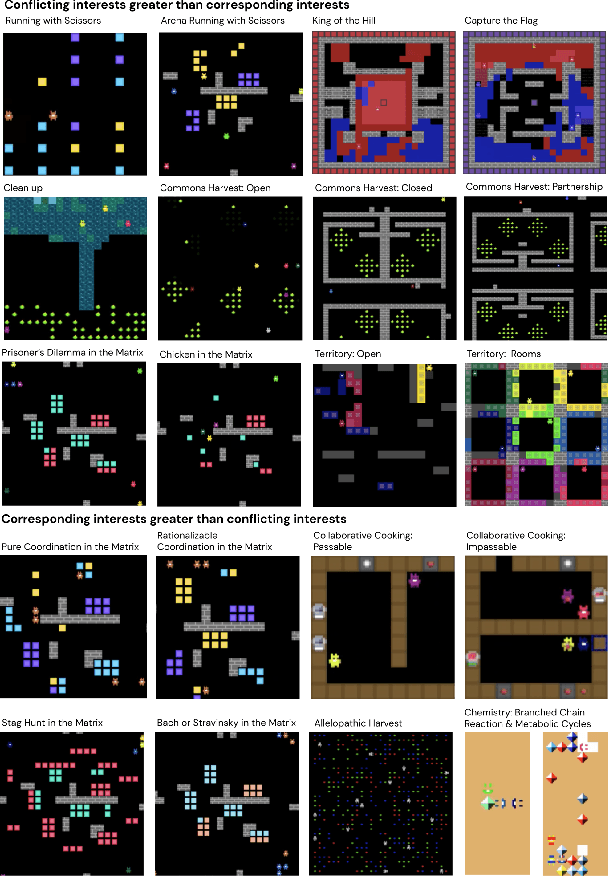
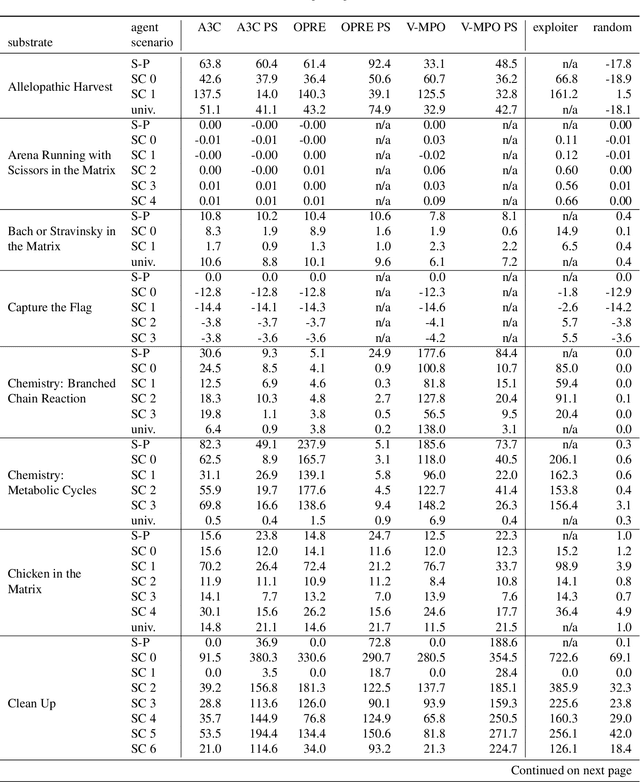
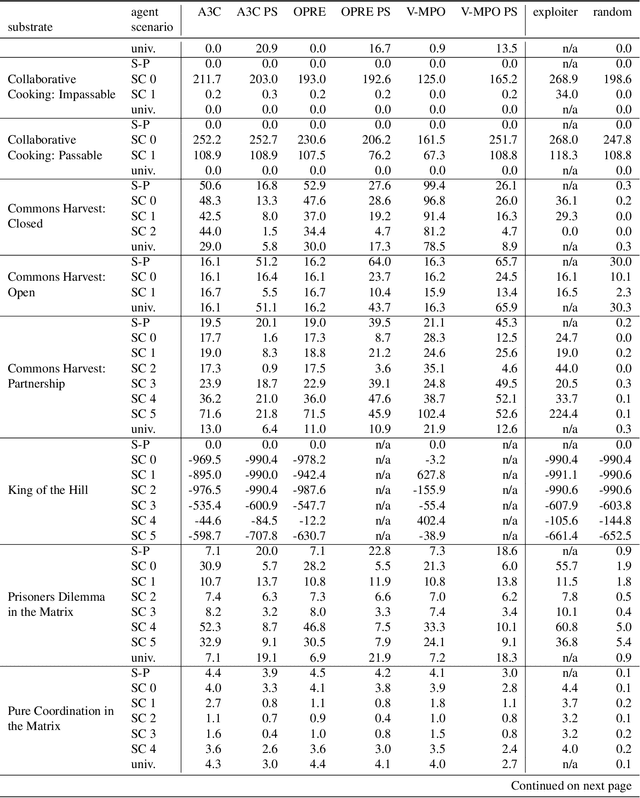
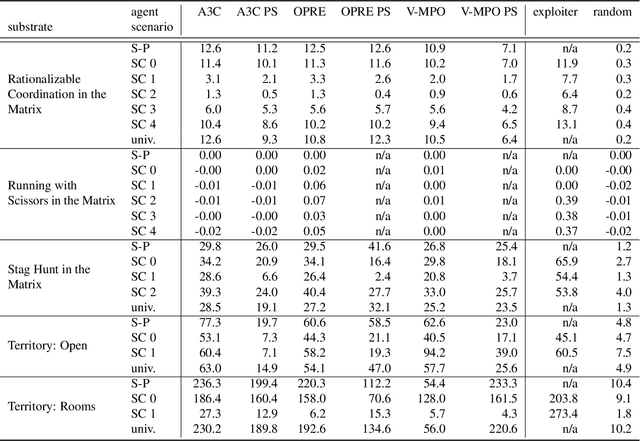
Abstract:Existing evaluation suites for multi-agent reinforcement learning (MARL) do not assess generalization to novel situations as their primary objective (unlike supervised-learning benchmarks). Our contribution, Melting Pot, is a MARL evaluation suite that fills this gap, and uses reinforcement learning to reduce the human labor required to create novel test scenarios. This works because one agent's behavior constitutes (part of) another agent's environment. To demonstrate scalability, we have created over 80 unique test scenarios covering a broad range of research topics such as social dilemmas, reciprocity, resource sharing, and task partitioning. We apply these test scenarios to standard MARL training algorithms, and demonstrate how Melting Pot reveals weaknesses not apparent from training performance alone.
* Accepted to ICML 2021 and presented as a long talk; 33 pages; 9 figures
 Add to Chrome
Add to Chrome Add to Firefox
Add to Firefox Add to Edge
Add to Edge